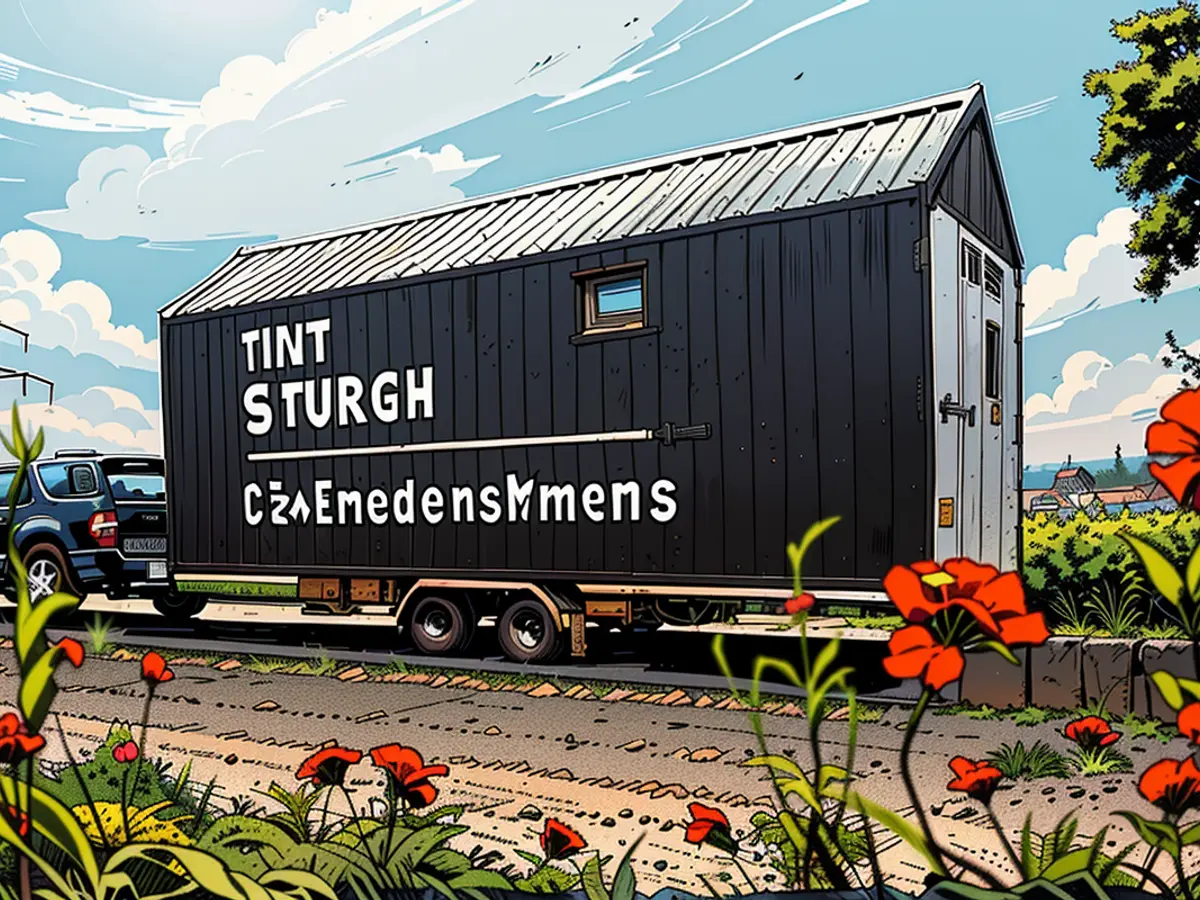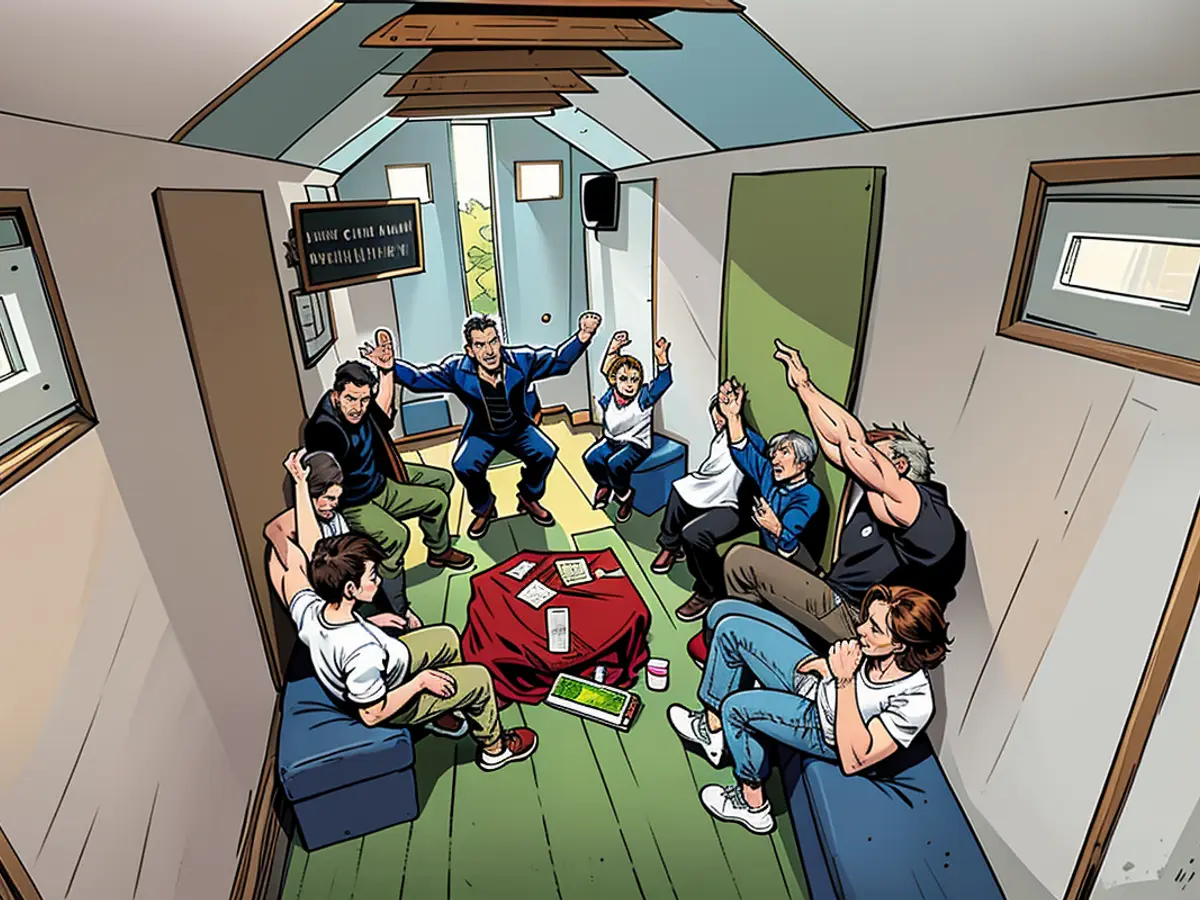Mini church on wheels hits a nerve
Church pews empty, churches close - and a XS-Chapel rolls through the streets. The Tiny Church from Paderborn can be rented out. Similar initiatives exist scarcely elsewhere.
The church passes by residential houses, goes through industrial areas, brakes obediently next to cars and motorcycles - and at the roadside it causes surprised faces. Many people smile as the Tiny Church with the license plate PB TC 777 crosses paths in north rhine-westphalian Paderborn. A rolling mini-church, which can also be rented - an unusual idea and so far quite rare. Similar initiatives exist scarcely in other places in Germany.
A mobile church with modern technology - what is it for and for whom? The mobile church with a window cross and the inscription "Tiny Church - The Peace Church" is an attraction. As an initiative of the Kolping School Works in Paderborn, it has a fixed location on a Kolping Estate Farm in the district of Höxter. The XS-Church is used there for educational work with children and adolescents. It is also open to visitors - for prayers or as a retreat. And the freshly blessed chapel can also be borrowed. Then comes the TÜV-tested wood-corrugated iron construction - 8.10 meters long, 3.75 meters high, and 3.5 tons heavy - on a trailer.
Inside, the Mini-Church is bright, there are bench seats, speakers, a table for setting up. No altar, no religious symbols, no cross with corpus, everything is deliberately "functionally-purist". The room is completely different usable. Even one who is not a Christian can "dock". There is color lighting, music can be played, or a "prayer for peace" can be sent to one's smartphone.
From all over the world, a candle can be lit virtually through a QR code, which burns for 72 hours and also flickers on a monitor in the Tiny Church. A bell is also planned. A photovoltaic power plant also belongs to it. New ways in times of empty church pews and declining membership numbers?
The Archdiocese of Paderborn is financially supporting this "innovative idea", speaking of a "future-oriented concept of a church that is on the move and present in the social-church realm". A spokesperson for the Evangelical Church in Germany says: "Church must be more flexible and present at changing locations." A spokeswoman emphasizes: "Communities will become more colorful and diverse, the spiritual needs and expectations of people different." The proximity to the people remains essential for the church work - and Tiny Churches are "a successful way to make contact with the people".
Another concept than the baker's cart
In the baden-württemberg community of Ruppertshofen near Stuttgart, there has been a movable mini-church since 2014, as evangelical pastor Uwe Bauer reports. Five meters long, 2.50 meters wide, with a bell and an altar. "She is always in use, especially in the summer for open-air services", describes the pastor. "It's noticeable: People come less and less to church, but when the church comes to them - to the campsite, to the parking lot, to the lake, then the people are there."

Currently, the rolling chapel, named Bänke, carries 150 people, all of whom are set up and always fully occupied. "The longing for conversations, encounters, community is there." Presbyter Schulz from North Rhine-Westphalia emphasizes: "Small units will become more important." He sometimes attends church services with very few people in large halls. There is no proper atmosphere in such cases. With the Tiny Church, one touches a nerve. He clarifies: "However, it is not a chapel where I can now travel as a clergyman and celebrate church services, where there are none." It's not about replacing structures, he says, looking at churches that have had to close due to dwindling membership numbers in Christian churches for years. So there's no parallel to the bakery wagon that travels across the country because bakeries have consolidated.
Openly Embracing Ideas
The Tiny Church aims to roll into society without rigid preconceptions, explains Eva-Klare Kurtenbach, the business manager of the Kolping-School. "We are open to ideas first. We want to give freedom and are excited." One would like to "introduce certain rituals," such as incorporating peace prayers. The little church could also be a resting place at parties, a place for encounters and conversations, or even a venue for a poetry slam. "Perhaps the feeling of being lost in the large church can be alleviated," suggests the tiny church's visitor.
The tiny church visits kindergartens.
"The Tiny Church is a great idea. I immediately said I want to have it here for a week for the children and their families," reports Michaela Pape, head of the Adolph-Kolping-Kita in Borchen near Paderborn. "There is hardly any physical contact with the church in our society today." Most of the nearly 80 kindergarten children are non-denominational. They are eagerly awaiting the visit of the small church. Some gather around in a circle on pillows. "In this small church, one can reflect on what one wants to do," explains Pape to them. The boys and girls sing loudly, talk about people they love, and light virtual candles on the screen. "I found it very cozy in there," says the five-year-old Tilda.
Is interest in the Tiny Church concept growing? Preparations have been underway in Frankfurt for some time for a Tiny Church that is expected to be completed by the end of the year and put to use in a rapidly developing residential area. "So far, we have had a come-culture - going to church in the village or city church, which is quite present as real estate. We're going out into the neighborhood now," says sociologist George Kurumthottikal from the Sankt-Jakobus-Community. "What we are experimenting with here and potentially achieving could be applied to other new building areas. We are in contact with many cities."
The unique XS-Chapel, with its 'International' symbolism, can be rented out and used for religious events or as a peaceful retreat, appealing to various 'Religions'. This mobile church initiative, inspired by similar efforts in places like Ruppertshofen, Germany, seeks to bring 'Churches' closer to people by traveling through urban and rural areas.







